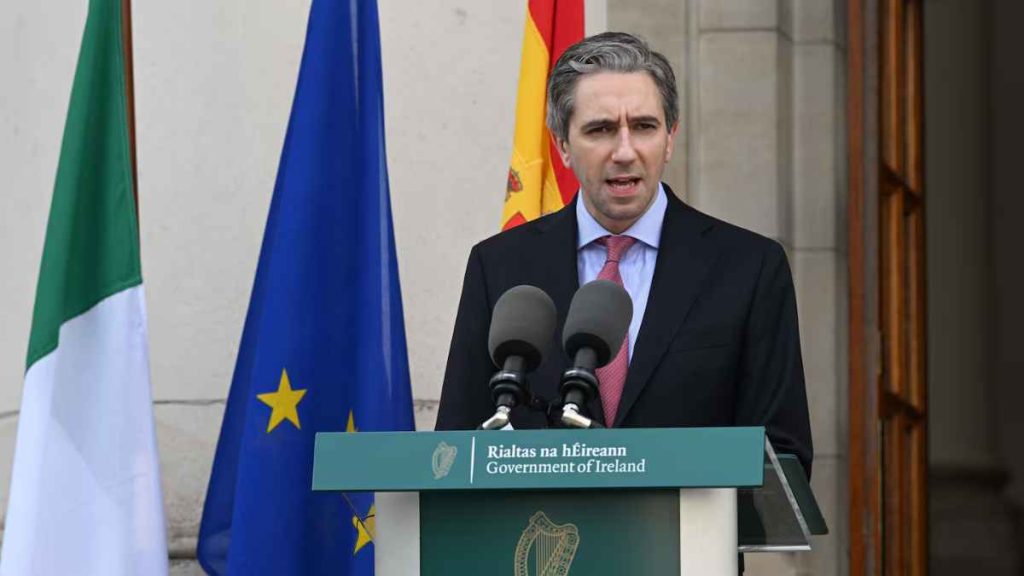The recent closure of the Israeli embassy in Ireland marks a significant deterioration in diplomatic relations between the two countries, raising concerns about the potential impact on trade. This unprecedented move, described by the Israeli Foreign Ministry as a response to Ireland’s “extreme anti-Israel policy,” comes amid heightened tensions following the ongoing conflict in Gaza and Ireland’s increasingly vocal support for the Palestinian cause.
This diplomatic rupture is particularly noteworthy as it represents the first time Israel has closed an embassy in a European Union member state. The decision reflects growing frustration within Israel regarding Ireland’s stance in international forums, including its recent alignment with Palestinian interests in legal proceedings at The Hague.
Ireland has long been regarded as one of the most pro-Palestinian nations within the EU. Since the outbreak of conflict on October 7, 2023, public sentiment and political discourse in Ireland have increasingly favoured Palestinian perspectives. Prime Minister Leo Varadkar has publicly expressed solidarity with the Palestinian people, stating, “We see our history through the eyes of [the Palestinians].” Recent polls indicate that a significant majority of Irish citizens perceive Israel as committing genocide in Gaza and believe that Palestinians live under an apartheid regime.
In response to these sentiments, the Irish government has taken several actions that could affect trade relations with Israel. These include attempts to suspend trade agreements between Israel and the EU, the independent enactment of a law to boycott products from Israeli settlements, and a decision by the Irish sovereign wealth fund to divest from Israeli companies. Furthermore, Ireland recognised the state of Palestine earlier this year, in a move coordinated with other nations such as Spain and Norway.
The economic ties between Israel and Ireland are substantial, with total trade reaching €5.9 billion in 2023, divided equally between goods and services. Israel’s exports to Ireland included €2.5 billion worth of electronics and industrial equipment, while imports from Ireland mainly consisted of electronic equipment and pharmaceuticals, totalling €500 million.
Despite these robust trade figures, the atmosphere has become increasingly challenging for Israeli businesses operating in Ireland. Ofir Angel, chairman of the Israel-Ireland Chamber of Commerce, noted that inquiries from Irish companies about potential collaborations have dropped by 80% since the escalation of the conflict. “It’s as if Irish companies are hesitant to engage with Israel,” he remarked, highlighting the shift in perception that has accompanied the war.
From a strategic standpoint, the closure of the embassy is a troubling development for Israel. With Ireland serving as a hub for many international tech companies, the loss of diplomatic representation means that Israeli firms may find it more difficult to navigate the Irish market. Angel emphasised the importance of the embassy’s role in facilitating connections for Israeli companies looking to expand into Europe.
Dr. Maya Sion-Tzidkiyahu, director of the Israel-Europe Relations Program at the Mitvim Institute, stressed the significance of this diplomatic rift, stating that it sends a strong message about Israel’s intentions towards Ireland. “The closure signifies a belief that there is no point in maintaining relations,” she said.
In Ireland, the embassy closure has been met with mixed reactions. While Irish officials, including Foreign Minister Micheal Martin, have reiterated their commitment to maintaining an embassy in Israel due to its vital work, concerns remain about the broader implications of this diplomatic breakdown.
As tensions continue to escalate, both countries face an uncertain future in their trade relations, which could have lasting impacts on their respective economies.


